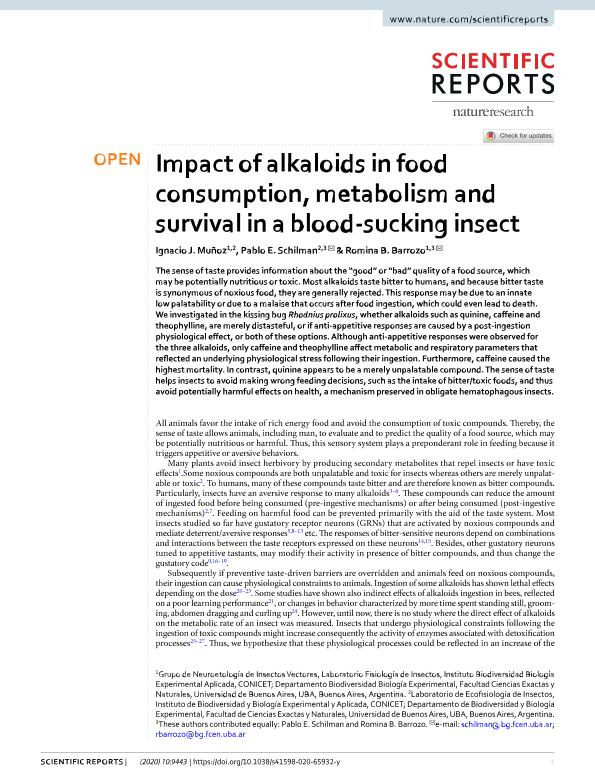Mostrar el registro sencillo del ítem
dc.contributor.author
Muñoz, Ignacio Joaquín

dc.contributor.author
Schilman, Pablo Ernesto

dc.contributor.author
Barrozo, Romina

dc.date.available
2022-11-12T01:30:59Z
dc.date.issued
2020-06
dc.identifier.citation
Muñoz, Ignacio Joaquín; Schilman, Pablo Ernesto; Barrozo, Romina; Impact of alkaloids in food consumption, metabolism and survival in a blood-sucking insect; Nature Publishing Group; Scientific Reports; 10; 9443; 6-2020; 1-10
dc.identifier.uri
http://hdl.handle.net/11336/177581
dc.description.abstract
The sense of taste provides information about the “good” or “bad” quality of a food source, which may be potentially nutritious or toxic. Most alkaloids taste bitter to humans, and because bitter taste is synonymous of noxious food, they are generally rejected. This response may be due to an innate low palatability or due to a malaise that occurs after food ingestion, which could even lead to death. We investigated in the kissing bug Rhodnius prolixus, whether alkaloids such as quinine, caffeine and theophylline, are merely distasteful, or if anti-appetitive responses are caused by a post-ingestion physiological effect, or both of these options. Although anti-appetitive responses were observed for the three alkaloids, only caffeine and theophylline affect metabolic and respiratory parameters that reflected an underlying physiological stress following their ingestion. Furthermore, caffeine caused the highest mortality. In contrast, quinine appears to be a merely unpalatable compound. The sense of taste helps insects to avoid making wrong feeding decisions, such as the intake of bitter/toxic foods, and thus avoid potentially harmful effects on health, a mechanism preserved in obligate hematophagous insects.
dc.format
application/pdf
dc.language.iso
eng
dc.publisher
Nature Publishing Group
dc.rights
info:eu-repo/semantics/openAccess
dc.rights.uri
https://creativecommons.org/licenses/by-nc-sa/2.5/ar/
dc.subject
bitter
dc.subject
taste sense
dc.subject
toxic
dc.subject
metabolism
dc.subject.classification
Zoología, Ornitología, Entomología, Etología

dc.subject.classification
Ciencias Biológicas

dc.subject.classification
CIENCIAS NATURALES Y EXACTAS

dc.title
Impact of alkaloids in food consumption, metabolism and survival in a blood-sucking insect
dc.type
info:eu-repo/semantics/article
dc.type
info:ar-repo/semantics/artículo
dc.type
info:eu-repo/semantics/publishedVersion
dc.date.updated
2021-09-07T18:21:22Z
dc.identifier.eissn
2045-2322
dc.journal.volume
10
dc.journal.number
9443
dc.journal.pagination
1-10
dc.journal.pais
Reino Unido

dc.description.fil
Fil: Muñoz, Ignacio Joaquín. Consejo Nacional de Investigaciones Científicas y Técnicas. Oficina de Coordinación Administrativa Ciudad Universitaria. Instituto de Biodiversidad y Biología Experimental y Aplicada. Universidad de Buenos Aires. Facultad de Ciencias Exactas y Naturales. Instituto de Biodiversidad y Biología Experimental y Aplicada; Argentina
dc.description.fil
Fil: Schilman, Pablo Ernesto. Consejo Nacional de Investigaciones Científicas y Técnicas. Oficina de Coordinación Administrativa Ciudad Universitaria. Instituto de Biodiversidad y Biología Experimental y Aplicada. Universidad de Buenos Aires. Facultad de Ciencias Exactas y Naturales. Instituto de Biodiversidad y Biología Experimental y Aplicada; Argentina
dc.description.fil
Fil: Barrozo, Romina. Consejo Nacional de Investigaciones Científicas y Técnicas. Oficina de Coordinación Administrativa Ciudad Universitaria. Instituto de Biodiversidad y Biología Experimental y Aplicada. Universidad de Buenos Aires. Facultad de Ciencias Exactas y Naturales. Instituto de Biodiversidad y Biología Experimental y Aplicada; Argentina
dc.journal.title
Scientific Reports
dc.relation.alternativeid
info:eu-repo/semantics/altIdentifier/url/http://www.nature.com/articles/s41598-020-65932-y
dc.relation.alternativeid
info:eu-repo/semantics/altIdentifier/doi/http://dx.doi.org/10.1038/s41598-020-65932-y
Archivos asociados
